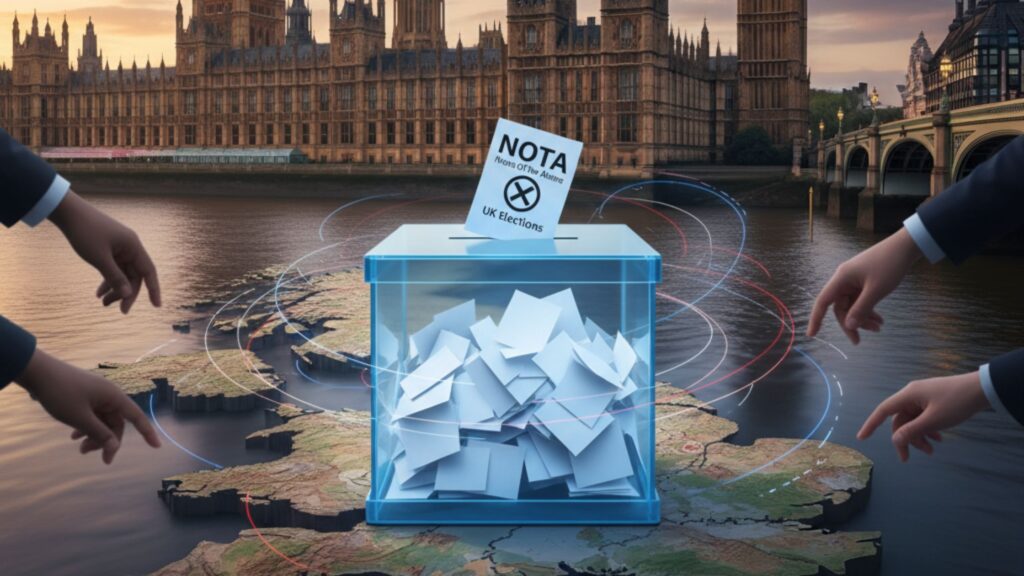
The discussion about adding a “None of the Above” choice has been gaining attention in the political landscape. The idea of introducing a NOTA option UK elections system is sparking debates among politicians, reform advocates, and everyday voters. Many believe this option could reshape the way citizens engage with elections, while others question whether it would truly strengthen democracy or simply add another layer of complexity. Veto Campaign has observed how conversations about NOTA are becoming more mainstream, especially as voters demand more choices that reflect their dissatisfaction with current parties.
What is the NOTA Option?
The NOTA option, also known as “None of the Above,” allows voters to officially reject all the candidates listed on the ballot. Instead of staying at home or spoiling their vote, individuals can express disapproval in a recognized way.
NOTA is not a new concept in global politics. Countries like India and certain US states have implemented it in various forms, giving citizens a way to protest while still participating in democracy.
Why the UK is Talking About a NOTA Option
Growing Voter Dissatisfaction
The UK has seen declining trust in politicians, with many citizens feeling that none of the candidates represent their interests. A NOTA option could give those voices a stronger outlet.
Increased Demand for Political Reform
Movements and groups such as Veto Campaign highlight that reforms are needed to boost confidence in the electoral process. Adding NOTA could be a step toward rebuilding trust.
Potential Benefits of a NOTA Option in UK Elections
Encouraging Voter Turnout
One major benefit would be encouraging those who normally abstain to vote. By offering a meaningful way to express dissatisfaction, elections may see increased turnout.
Sending a Clear Message to Politicians
If a large number of voters select NOTA, it becomes a clear signal to political parties that change is needed. This could push candidates to address real concerns more directly.
Promoting Political Accountability
With a NOTA option, politicians may feel more pressure to deliver policies that genuinely reflect public interest, knowing that widespread rejection is a possibility.
Possible Drawbacks of a NOTA Option
Risk of Political Instability
Critics argue that if many people vote for NOTA, it could undermine the legitimacy of elected representatives. Questions may arise about the true mandate of winning candidates.
Lack of Real Consequences
In many countries, even if NOTA receives the highest votes, the candidate with the most support still wins. Without reform, this may limit the practical impact of the option.
Administrative and Legal Challenges
Introducing NOTA would require changes in electoral laws, ballot design, and voter education. These adjustments would take time and resources.
Global Examples of NOTA in Practice
India’s Experience
India introduced NOTA in 2013, allowing voters to express discontent formally. While it has gained usage, critics argue it has not led to significant reforms.
United States Cases
Certain US states allow a similar option, like Nevada’s “None of These Candidates.” Although symbolic, it has influenced discussions about political representation.
Lessons for the UK
These international examples show both the symbolic power and the limitations of NOTA. The UK can learn from these experiences when considering reforms.
How Would a NOTA Option Work in the UK?
Possible Implementation Methods
The UK could introduce NOTA as a separate box on the ballot or through electronic voting adjustments. Either way, public awareness campaigns would be crucial.
Impact on Major Political Parties
Both large and small parties might need to rethink their strategies if NOTA gains traction. Campaigns would shift toward building genuine voter trust.
Effect on Independent Candidates
Independent candidates may benefit, as voters seeking alternatives could be more open to their platforms if NOTA becomes part of the system.
Public Opinion and Reactions
What Polls Suggest
Surveys indicate that many UK citizens would welcome the chance to vote “None of the Above.” This shows demand for more flexible democratic choices.
Concerns Raised by Opponents
Some argue that NOTA would be a distraction from real reforms, such as proportional representation or campaign finance transparency.
The Role of Veto Campaign in Promoting Debate
Advocating for Electoral Reform
Veto Campaign actively raises awareness about reforms like NOTA. The organization highlights the need for stronger voter representation in modern politics.
Educating Voters About Choices
Beyond just pushing for reforms, groups like Veto Campaign play an important role in educating voters about how these changes could strengthen democracy.
Future of NOTA in the UK Elections
Likelihood of Implementation
While the idea has support, actual legislative change requires political will. It may take time before UK lawmakers seriously consider the proposal.
Potential Long-Term Outcomes
If implemented, NOTA could change how elections are contested, how parties design policies, and how citizens feel about engaging with democracy.
Conclusion
In summary, the debate about introducing a NOTA option UK elections continues to grow in relevance. Supporters believe it could increase voter turnout, enhance accountability, and give citizens a more powerful voice. Critics, however, remain cautious about its practical impact and possible instability. From a third-person perspective, Veto Campaign emphasizes that the question is not only about adding a new checkbox on a ballot but about reimagining how democracy should respond to modern voter dissatisfaction. The choice of whether to introduce NOTA reflects the ongoing challenge of balancing symbolic reforms with meaningful political change.
Here, you can find more articles.




